YouTube is the place to be for both brands and aspiring content creators for two reasons: A huge potential audience and one of the most rewarding content monetization programs of any social platform. If you want to take advantage of these opportunities, you need our list of top YouTube tips.
After all, YouTube is the second-most visited website in the world, and 83% of U.S. adults are on the platform. Users stream a billion hours of video content every day. But it’s far from oversaturated. In fact, there’s never been a better time to start a YouTube channel.
These 18 YouTube tips for beginners, intermediate creators, and experts will help get you views, encourage people to subscribe to your channel, and keep you growing from day one and beyond.
Jump right to the most relevant section, or start reading now!
Get your free pack of 5 customizable YouTube banner templates now. Save time and look professional while promoting your brand in style.
8 YouTube tips for beginners
Ready to get started? These beginner YouTube tips will make sure you launch your channel on the right foot, setting it up for growth and success.
1. Pick the right channel name
The first thing you need to do is choose a name for your YouTube channel. What’s the perfect way to represent the type of content you plan to create?
The perfect YouTube channel name:
- Has your company or personal name in it
- Has a word or phrase that categorizes it
- Is short and easy to say
Some channel examples include Abbie Emmons, an independent author who shares content to help others write their first novel, Doctor Mike, as you may have guessed, a doctor who shares medical content, and Yoga With Adriene, a channel that shares full-length yoga routines.
Brands, like Surfer, Visme, and Hootsuite, tend to just stick to their brand name, making it easy to find them.
However, you will find more random names out there, like Unspeakable, a gaming channel, Cocomelon, a nursery rhymes channel, and That Practical Mom, a channel sharing life advice from a mom.
Consider your niche (more on that in the next tip), the types of content you want to share, and if it makes sense to just use your name or brand name. Or why not try out our YouTube name generator and let AI do it for you?
2. Pick the right niche
Relax, this is easier than choosing a channel name. Why? Because, unlike death and taxes, you can change your content niche.
You may think you’re passionate enough about something to fill hundreds of hours worth of content. But, you’ll find out for sure when the grind gets tough and you don’t want to get up early and film another video about it.
But while you can change your niche later, it may risk alienating any audience you’ve already built—so spend some time defining what your channel is going to be about.
To pick your niche, ask yourself:
- What do I lose track of time doing?
- What could I talk to my friends about for hours?
- In my free time, what do I search/watch/learn about online?
If you’re creating a YouTube channel for your brand, this step becomes a bit easier. What does your business do? That’s your niche.
To use the brands we mentioned in our last tip:
- Surfer, an SEO tool, shares videos about writing highly optimized content
- Visme, a graphic design tool, shares videos about creating visuals
- Hootsuite, a social media management tool, shares videos about using social media for marketing
Makes sense, right?
Oh, and if you’re worried about going on-camera yourself, we’ve got tons of faceless YouTube channel ideas for you to consider.
3. Optimize your channel
Set your channel up for success by fully optimizing and filling out your profile. Even if your subscriber count is still in the single digits, make sure you look established right from the start.
To do that, you’ll need to add:
- Profile photo. As a creator, this should be a professional headshot of yourself; as a brand, this should be your logo
- Channel art. Create a graphic that helps to showcase what viewers can expect from your channel
- Video watermark. Add a watermark (ideally your channel logo) that appears in the corner of all your videos for further recognition
- Channel description. Explain what your channel will be all about, or consider using our YouTube channel description generator
- Links/contact info. Add links to your other social media channels as well as an email address or website to let people get in touch with you
- Featured video. Choose the perfect introductory video to live at the top of your YouTube channel
- Verify your channel. Getting verified on YouTube helps boost your credibility and help subscribers trust your channel
You can make all of these changes in the Channel customization area of your YouTube Studio. Providing all of this information upfront helps people understand if they want to subscribe and follow along with your content or not.
Plus, it looks much more inviting. Here’s an example of a channel that’s been fully optimized:
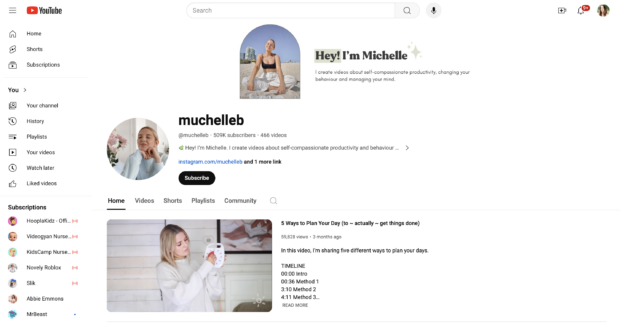
4. Set a consistent posting schedule
If you want to grow your YouTube channel, you need to be consistent. That means setting a realistic publishing schedule and sticking to it.
A common posting schedule is once weekly, but you need to make sure that’s a realistic cadence for you to achieve. When you’re just starting out, creating and editing your videos might take a long time.
Consistency matters more than frequency. If you can only make a video once every two weeks, that’s fine.
Creator burnout is a huge issue. TikToker and YouTuber Jack Innanen summed it up as: “I get to the point where I’m like, ‘I have to make a video today,’ and I spend the entire day dreading the process.”
Sticking to a sustainable schedule will keep you moving forward without burning out, increasing the chances you’ll stay with your creator journey long enough to see results.
5. Invest in high-quality video equipment
If you want to be seen as a serious YouTube creator, you need high-quality content. One major part of creating high-quality content is having high-quality equipment.
While you don’t need to spend a ton of money on top-of-the-line gear when you’re just beginning your YouTube journey, your smartphone’s camera isn’t going to cut it for the production level that YouTube requires.
Instead, invest in some decent video equipment. Some of the basics include:
- Video camera
- Camera stabilizer (i.e., tripod)
- Microphone
- Lighting
- Green screen
- Video editing software
6. Make small improvements in every video
Spicy YouTube marketing tip: You can’t get views and subscribers without first having videos.
As popular YouTuber Ali Abdaal says, “Your first video is going to suck.” He recommends instead of trying to make every video “the best,” try to improve one small element each time. Try a new title sequence, add some background music, or test a new editing software.
Those small changes add up over time to improve your channel without being overwhelming.
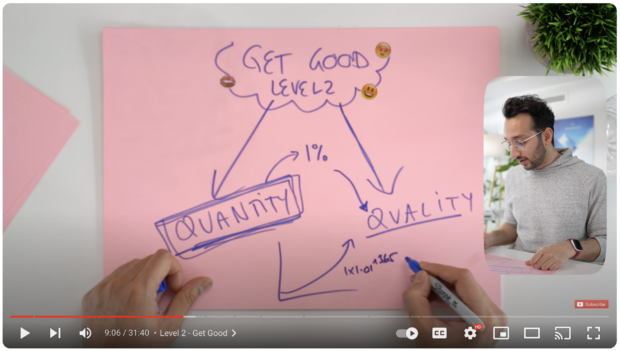
Source: Ali Abdaal on YouTube
7. Create eye-catching thumbnails
Your video thumbnail is what really hooks people. They’ll decide in a millisecond if your video is worth watching based on it.
Some creators spend up to 2 hours making one thumbnail image. One YouTuber even makes several options, saying “My designer spends around 3-4 hours making 6-7 per video. If one thumb performs badly, we swap it out.”
Your thumbnail should be so good that people don’t even need to read the title to understand what the video is about.
Art with Flo’s thumbnails are well-branded with a common color palette and style, so viewers can instantly recognize their tutorials in search results.
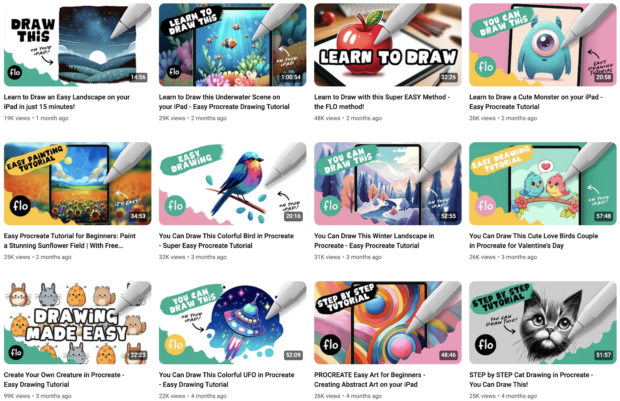
A few thumbnail design tips:
- Use icons or logos (if applicable for your topic)
- Keep text minimal
- Add creative elements to catch the eye, like hand-drawing, neon lights, etc (depending on your brand)
8. Completely fill out your video descriptions
You have a character limit of 5,000 characters in your YouTube description, which can equal out to about 800 words. That’s a micro-blog in itself, so don’t be afraid to take up some space.
First, and we’ll discuss this more in our first “intermediate” YouTube tip, you want to include a keyword within the first bit of your video description to help YouTube’s algorithm clearly understand what your video is about.
Take a look at this example from Hootsuite’s own YouTube channel. The video is all about social media trends, and we’ve made sure to include that keyword throughout the description:
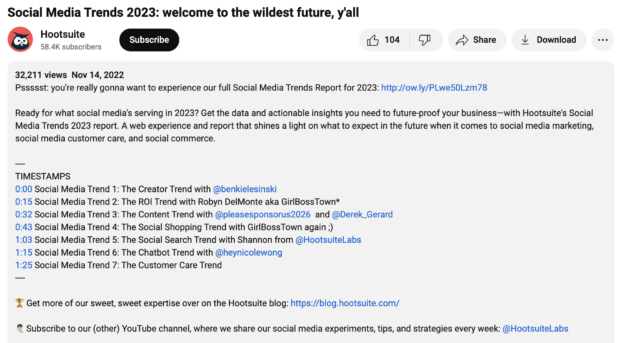
Once you’ve introduced your video with a brief description and keyword, it’s a good idea to include timestamps. If you look above, you’ll see that we’ve done this in our own video description.
Video timestamps, also known as chapters, are clickable links that allow viewers to skip around a video. Without them, people may leave if they can’t easily find what they’re looking for.
You can add timestamps manually or YouTube can auto-create them. To add them manually, type them into your video description. To create a clickable list, you’ll want to include at least three timestamps, formatting them like “01:05 Name of Chapter.”
You can also edit past uploads to include timestamps this way. After you save the description, you’ll see clickable timestamps like the above example.
From there, you’ll want to use the rest of the description field to tell viewers about you, your business, and link out to your other platforms.
This can be a boilerplate template that’s roughly the same for each video, though consider tweaking it if you have a special sale going on or mention any products in your video.
Otherwise, always include:
- Links to your other social profiles
- Your website and/or a specific landing page
- A short blurb about you/your company
- Contact information
Still want some help? Grab one of our free, editable video description templates or take advantage of our YouTube video description generator.
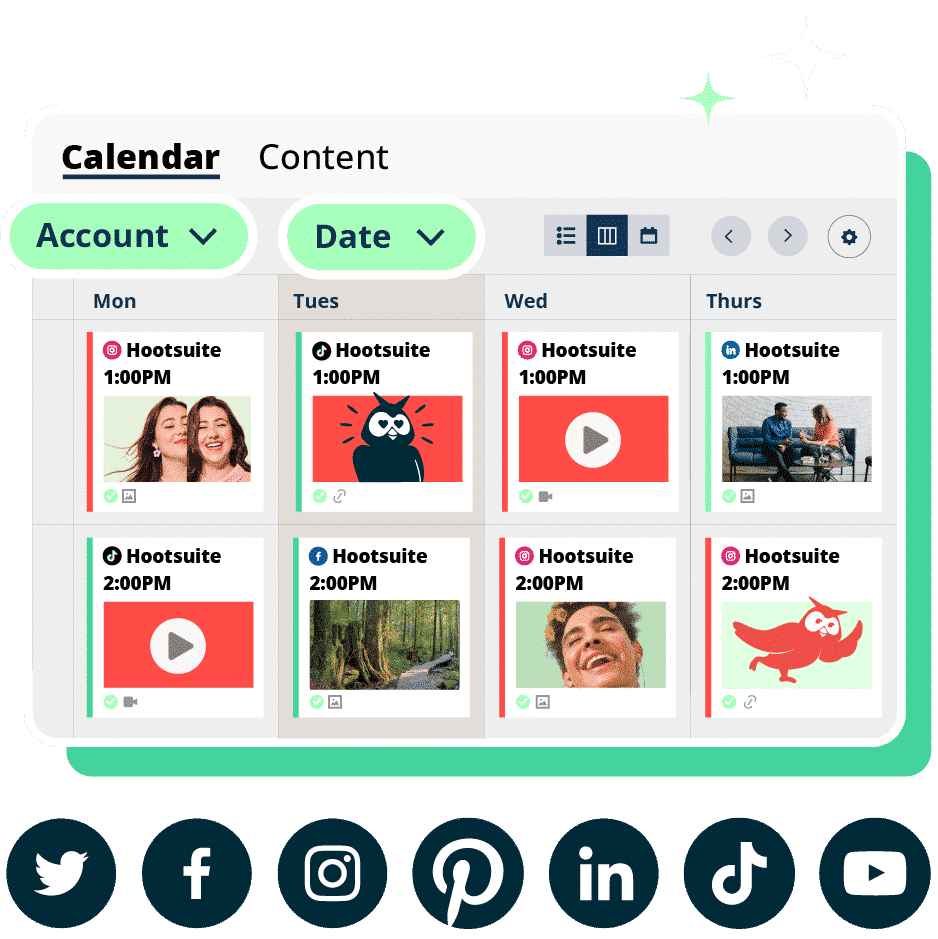
5 intermediate YouTube tips and tricks
Once you’ve had your YouTube channel for awhile, you may be ready to take it to the next level. These intermediate tips and tricks will help put you on the right path for growth.
9. Optimize your videos for search
YouTube is a search engine, like Google—except the search results are all video. This means you need to employ YouTube SEO tactics, like using focus keywords, that help your videos show up in search.
Keywords help the YouTube algorithm understand what your video is about, making it more likely to show up in the “suggested” column alongside related videos (see below) as well as in related search results. This means you have a better chance of reaching new viewers.
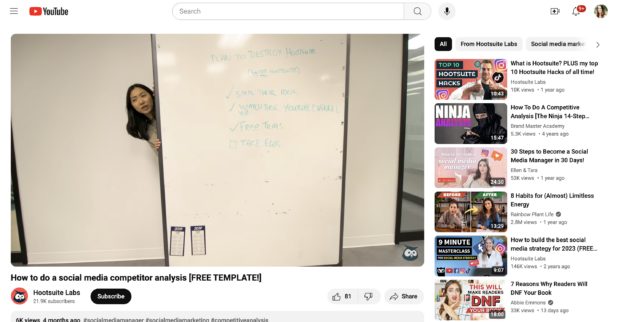
Keywords can be as simple as one word, but phrases of two or more words will often give both YouTube and people a better idea of your topic, such as “social media competitor analysis,” like you see in the above example.
Don’t go overboard here—one keyword in your title is fine. Plus: Keep it short.
Studies show video titles under 10 words perform best in YouTube’s search results, with 81% of top-ranking videos being under this limit.
More importantly, aim for around 60 characters max for your title length, which is about 8-10 words (with spaces). You’re allowed 100 characters, but only the first 60 show in search results.
Clueless about keywords? We’ve got more YouTube keyword research tips, or try out a free online tool like KeywordsPeopleUse to quickly find…keywords people use.
10. Monitor your analytics
To go forward, you need to go back…in time. Not with a Delorean, but by reviewing your YouTube analytics at least monthly.
Find your analytics in the left-side menu in YouTube Studio.
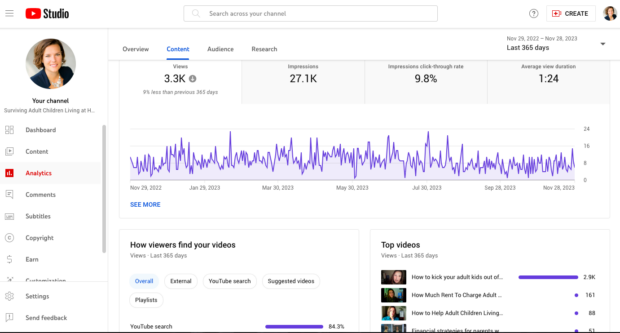
Key metrics to help you understand how your channel is performing:
- Subscribers: Including unsubscribes
- Top videos: Give your audience more of what they want
- Channel watch time: This should trend upward every month, or you may need to revisit your content strategy
- Traffic sources: See how viewers find you, including search keywords
Plus, you can explore demographics and more, including ad revenue statistics once you meet the YouTube Partner Program eligibility requirements to monetize your content.
11. Organize your content with playlists
YouTube playlists help you rank higher in search results because users are more likely to keep watching the next video, which increases your overall views and watch time—and makes YouTube think you’re pretty cool.
You can add other creators’ videos to your playlists—which is a good idea for collaborations later on—but at first, make your own. Group your videos by topic, or keep a specific series together. (Bonus tip: Later on when you get big and famous with a fancy verified account, you can create official series playlists.)
You can manage your playlists in YouTube Studio, either under Content > Playlists or by quickly adding a new one from the top Create menu.
Here’s an example of what this could look like on your channel:
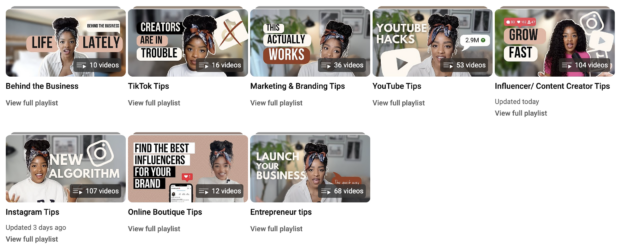
12. Collaborate with other YouTube channels
One great way to increase your reach is to collaborate with other YouTubers on videos. For example, if you’re featured or mentioned by another channel, you’re reaching a new audience of potential subscribers.
Find a YouTube channel that creates similar content to yours (though if you’re a brand, you’ll want to avoid any direct competitors, focusing instead on working with creators or complementary brands) and reach out about a partnership.
Create a video (or two—one for each channel) together, then use it as a way to promote each other’s YouTube channels.
13. Caption your videos
Closed captioning your videos makes your content accessible and inclusive to everyone. Approximately 1 in 5 people experience a degree of hearing impairment, and about 5% of the global population is deaf or hard of hearing. Captions ensure you don’t exclude any of your potential audience.
You can either supply your own written transcripts or have YouTube automatically caption it with automated speech recognition.
For creators just starting out, YouTube’s automatic captions are a great option. You can edit the captions if YouTube gets any words wrong, and editing is a lot faster than typing captions from scratch.
However, once your channel starts taking off or earning income, consider hiring someone to professionally transcribe your videos. Go even further and caption your videos in multiple languages—YouTube will show viewers captions in their preferred language—to build a global audience.
5 expert-level YouTube channel tips
Mastered all these other tips? Here are a few expert tips for helping you reach the next level with your YouTube channel.
14. Monetize your channel
Once you’ve started growing your channel, why not make some money from YouTube? The platform has a great monetization plan, and the average YouTube creator brings in almost $5,000 per month.
That means YouTube can be a great side hustle—or even replace your full-time job—if you’re able to stick with it and generate a large following.
To monetize your YouTube channel, you have to be accepted into the YouTube Partner Program (YPP). Eligibility requirements include:
- Follow the YouTube channel monetization policies
- Live in an eligible country/region
- Follow community guidelines
- Turn on 2-step verification
- Have access to advanced features (an advanced form of YouTube verification)
- Have an active AdSense account linked to your YouTube channel
- Have at least 1,000 subscribers
- Have either 4,000 valid public watch hours in the last 12 months or 10 million valid public Shorts views in the last 90 days
Once you’ve hit the threshold, you can apply for the YouTube Partner Program. If accepted, you can start receiving revenue from the ads shown within your YouTube videos.
15. Try YouTube Shorts
YouTube Shorts are crucial for promoting your channel which is especially important for new creators. As of Q2 2023, YouTube Shorts has over 2 billion monthly active users.
Shorts are vertical short-form videos similar to TikTok videos or Instagram Reels. They’re featured in a dedicated Shorts section where users swipe through them.
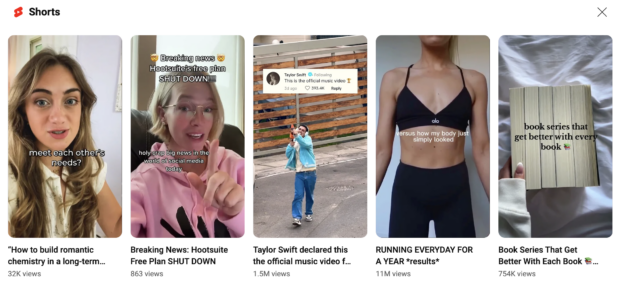
Take a 15-second snippet from your latest video and upload that as a Short. Better yet, grab a few snippets from each video as you’re editing it and you’ve now got 2-3 Shorts to publish throughout the week.
Read our YouTube Shorts guide for tips to make the most of this exciting new format.
16. Master video editing
Your YouTube content—what you’re saying, how you’re saying it, what’s unique about it, etc.—is what hooks people, but good video editing is what keeps them watching and coming back.
Editing will take much longer than actually filming the video but it’s time well spent. Borrow inspiration from your favorite YouTubers to start figuring out your own editing style and techniques. Your videos won’t look as slick as theirs right away, but you’ll get better.
Invest in high-quality video editing software and become a pro. Not only will this make your videos better and better, but it’ll also make the editing process much faster and easier the better you get.
Depending on your budget, you could outsource to a professional video editor as soon as you start your channel. However, for most creators, the ability to do this only comes after their channel starts making money.
Either way, make sure you’ve mastered video editing, then set a goal for yourself to hire an editor once your YouTube account starts making a certain amount per month. It will free up your time to focus on creating content.
17. Attend YouTube conferences
Consider attending workshops or conferences for YouTubers that are dedicated to helping creators learn more about growing their channels. These can also be a great place to network and create connections with other YouTubers.
A few conferences to consider include:
- VidCon
- VidSummit
- Web Summit
These conferences can be a great place to get even more growth tips, come up with new ideas, and learn new skills that can help you improve your channel even more.
18. Create a content distribution strategy
Publishing your YouTube videos on your channel and calling it a day isn’t nearly enough. You need a content distribution strategy that can help you reach an even wider audience.
Though your YouTube SEO efforts should help you increase your reach on the platform, there are other ways off-platform to promote your videos.
Your YouTube video promotion strategy should include tactics like:
- Share on your other social media channels
- Link to from your email newsletter
- Share in online forums and communities
- Embed in your blog or on your website
- Use YouTube video cards and end screens to link to other videos
- Create playlists to group similar content
- Run YouTube ads to boost your videos
- Partner with YouTube influencers to reach a wider audience
- Link to other YouTube videos from your video description
Ready to start and grow your YouTube channel in 2024? Schedule, publish, and analyze your YouTube videos — and all your other social media content — in one place with Hootsuite. Try it free today.
With files from Chloe West.
Grow your YouTube channel faster with Hootsuite. Easily moderate comments, schedule video, and publish to Facebook, Instagram, and X/Twitter.
The post 18 YouTube Tips To Grow Your Channel in 2024 appeared first on Social Media Marketing & Management Dashboard.

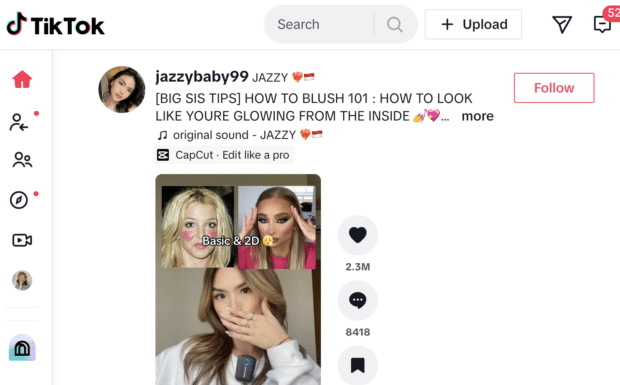



Recent Comments